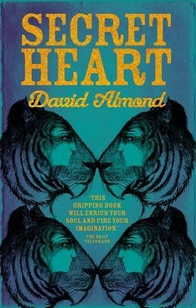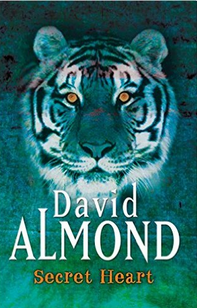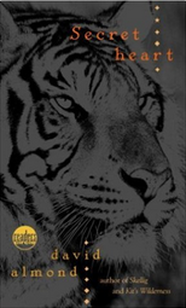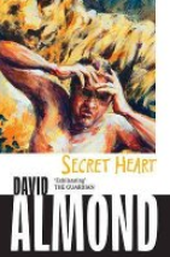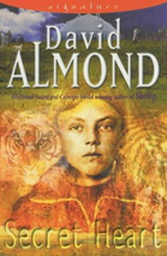Secret Heart
(2001, Ages 10 and Up)
6/2/17
When I was a kid, I used to look at the sky all the time. Initially it was because I REALLY wished I didn’t have go to school the next day and this could make me forget about that painful fact for at least a little while. As I’ve gotten older though, watching the sky helps me forget about everything. Not just my earthly responsibilities, like to my family, my jobs, my writing; not only my personal imperfections, like my Auditory Processing Disorder; and even more than abstract concepts associated with the sky, like angels and aliens. For a brief moment in time, I can pretend time itself doesn’t exist. I can let go of my mortal self. But eventually I come back down to Earth, and I have a sense of having been away for years despite only hours going by. The real world seems almost strange to me, and I feel both empowered and fearful by the mystery of what my future will hold for me from then on. I think that’s what makes this novel’s protagonist so relatable to me.
Virtually everyone in the near-forgotten village of Helmouth seems to think they know how Joe Maloney should be. His classmates tease him for his severe stuttering; his mother, though loving and devoted, wishes that he would act more responsible; and his best friend wants to teach him to be a man by hunting and killing. Joe, however, would rather simply contemplate the world around him: the strange creatures in the sky and the songs he hears them sing—and more recently, the awesome and mysterious tiger that has been visiting him in his dreams. At the same time, the once famed Hackenscmidt’s Circus has come to the village for its final show, and Joe finds himself immediately drawn to it despite the hostile taunts of his peers. It is with the guidance of the peculiar but kindhearted performers, especially the beautiful young trapeze artist Corinna, that Joe is able to follow his path to self-discovery and unearth many miracles along the way.
Granted, I first read this book at a much younger age, but to be honest, I initially wasn’t sure what to make of it. From the synopsis alone I couldn’t tell either the central conflict or the characters’ goals, and plot-wise it was unlike anything I had read before. In retrospect, I think it reads more like a poem, a story that is not so much a story, but an experience. There is a deep sense of sadness that permeates throughout, as though due to a hopelessness or a longing for something that can never be, even though nothing particularly bad has happened; but feelings, or a lack of them, don’t always need justification or explanation in order to manifest themselves.
In some ways, Joe seems just as spiritually lost. He doesn’t seem to know for certain what he wants out of life, nor does he have any particular fears or regrets. But what sets him apart is that he sees so much more than beauty where others see ugliness or triviality. But what that “so much more” is isn’t always clear, even if readers are being told what Joe is “seeing”. In fact, the writing seems to deliberately make it vague as to where real life ends and the supernatural (if it exists here) begins. There were some parts, for instance, when I couldn’t really tell whether Joe is truly seeing entities from another reality due to a genuine magical gift, or he is simply daydreaming, creating his own reality within his mind based on how he sees—or would like to see—the world around him:
“Soon Joe’s body began to twitch. He rolled from side to side. The distant tiny skylarks yelled. He opened his eyes and the sky was filled with them. They darkened the sky from horizon to horizon, a storm of trembling black specks that sang in the vast blue space between the village and the sun. Above the crags, the peculiar winged beasts wheeled across the sky. He closed his eyes again, heard a single skylark singing at the center of his brain, a sweet and frantic noise. Tasted its egg on his tongue, felt it trembling with life inside him. He stood up and crouched forward and gently stamped his feet on the earth. He turned slow circles. He let the skylark sing and fly. He gently stamped the earth. He groaned and let the noises in his throat become sweeter, sweeter, lighter, lighter. He spread his arms behind his back. He gently stamped his feet upon the earth. He sang. He trembled. He felt himself begin to disappear.
‘Joe! Joe, man!’
Stanny rubbed his eyes, crouched low in the ruins, snorted. ‘What you doing, Joe, man? You do the craziest things sometimes.’
Joe hesitated, mid-dance.
‘What you doing?’ said Stanny again.
Joe turned to him. What was he doing? He had no words for it, for the way his spirit sometimes soared inside him and blended with the earth and the sky. He had no words for the way his body trembled and seethed with such excitement.
“Just th-this,” he muttered. He closed his eyes, turned a circle, opened his eyes again.” (Pg. 27-28)
Almond uses a great deal of animal imagery throughout the story for several purposes, namely that of tigers and skylarks. Often they are presented as if they are spirits calling to those they would guide and protect if only the latter would listen. It’s with a sort of tragic irony that the more antagonistic characters, in their moral self-righteousness, act more savage that those they would deem the animals, seeming to have lost touch with these “spirits” in their quest to do something mature and important. Many of their arguments are the sort that one might feel inclined to agree with on principle. Yet these noble proposals are driven by a narrow-mindedness bordering on an even worse kind of barbarism, a sort of “with us or against us” mentality.
“‘Let me introduce our Mr. Maloney,’ [Bleak Winters] told [the class]. ‘And, Mr. Maloney, let me introduce some of your fellow pupils from Hangar’s High. Hangar’s High. You may not remember it. A redbrick educational establishment. Your school!’ He turned to the others and lowered his voice. ‘You may not yet have come across our Joseph Maloney, for he is an elusive little chap. Something of a star at the disappearing act.’
They carried computer-printed banners: BAN THE CIRCUS; CIRCUS MEANS CRUELTY: LET THE ANIMALS GO; TAKE YOUR TENT SOMEWHERE ELSE.
‘Come and join us, Mr. Maloney. This is our lesson for today, a bit of philosophy, history, political action. What right have we to use animals for our entertainment?’
He put his arm around Joe’s shoulder.
‘Come and join us.’ He snorted. ‘Or are you already enlisted as the new tiger tamer?’
‘There’s no t-tigers,’ said Joe.
Winters gasped. He raised a finger.
‘Let us listen to the words of an expert! Let us listen to the words of one who has already been inside the charnel house.’
‘There’s no t-tigers!’ Joe said. ‘There’s no w-wild animals! They’re gone.’
He wriggled free of Winters.
‘That’s not the point, Joe,’ said Francesca Placido, a skinny girl with a Tibetan hat on. ‘What about the dogs? What about the pigs? It’s not just tigers, it’s the whole animal world we have to think of.’
‘Well said, Francesca,’ said Winters. ‘Mr. Maloney?’
Joe felt the lark singing inside him and the tiger prowling inside him. He looked at the teacher, and knew that Bleak Winters was never anything else except Bleak Winters. He looked at the children. He knew that they, like him, might have larks and tigers inside them, but they kept them hidden, and one day their larks and tigers might disappear, just as Bleak Winters’ had. He wanted to tell them this, he wanted to draw them away from Winters and toward the tent and the wasteland, but he didn’t have the words.
He hunched his back, moved on.
‘Get back to school!’ Winters snapped. ‘Get back to school or you’ll be lost in your own stupidity.’
Joe listened to his larks. (Pg. 42-43)
While this metaphor can also represent the concept of the joys of childhood being at odds with the bitter realities of adulthood, I think an explanation like that would be too simplistic in this case. It might be more accurate to say that just because one life is ending, whether it be circus life or young life, doesn’t mean that life of another kind isn’t waiting. Nor doesn’t growing up and/or moving on mean losing one’s identity. Corinna makes it clear to Joe that the relationship between the circus animals and the performers was one of mutual love and respect—and still is. Even if the animals no longer exist in tangible form, such a relationship and its memory must still be cherished and treated with dignity:
“‘You’re more than you think you are,’ [Corinna] said. ‘You’re more than they think you are.’
[Joe] tugged his hands away.
‘I—I know I am!’ he said.
His face burned. He stared at her.
‘Only Maloney, lalalala . . .’
He gasped. His head rang with the voices of those who mocked him, those who said what he should be, those who said what he could be. The words struggled for life on his tongue.
‘And I—I—I am more that you think I—am!’ he stammered.
She touched his hand again, but he pulled it away.
‘That’s why we need your help, Joe,’ she said.
‘My help?’
‘That’s why the tiger came for you.’
He stared. He sighed. He wondered what she meant but he knew himself that the tiger had a purpose, that it had searched for him, that it had called him. And he felt the fur on his skin. He felt the heart drumming in his chest.
‘We find it hard to understand,’ she whispered, ‘but sometimes the most important things are the most mysterious. We don’t have words for them. But we need someone like you, Joe. No, we need you.’
Joe narrowed his eyes. He stared into her. He saw other worlds, other lives. He knew that Corinna had larks and tigers inside her. He knew that her mind could stretch as far as and beyond the Black Bone Crags.
‘It’s always been said,’ she whispered, ‘that when the circus comes to an end, we’ll need someone to take the beasts back to the forest. Only that way will the circus be truly ended. Only that way will our hearts be truly at rest. Only that way will we be able to think of beginning again.’
‘But there’s no w-wild beasts.’
She said nothing. She met his eyes. He nodded. He knew that there would always be wild beasts.” (Pg. 97-98)
This book may not appeal to everyone as strange descriptions and a lack of an obvious or traditional narrative goal can make it hard to follow at times, but as I said, this story seems to be less about logical understanding and more about simply feeling. Despite the atmosphere of inevitable loss throughout, Almond still weaves in a sense of hope with thoughtful characters, otherworldly grace, and wildly gorgeous imagery. While this setting seems like a perfect place for dreams to die, how they die depends on their dreamers. Dreams can be forced to die full of pain and grief, leaving a trail of regret for the living left behind. Or they can allowed to die as though from old age. Naturally, with some sadness, maybe, but also with acceptance. Quietly and peacefully so that other dreams and dreamers can take their place with strength and dignity.
CREDITS:
All images, audio, and links belong to their respective owners; no copyright infringement is intended.
All book excerpts are from Secret Heart by David Almond (published by Dell Laurel-Leaf, an imprint of Random House Children’s Books, a division of Random House, Inc.).
MAIN THEME:
“The Call” – Briand Morrison and Roxann Berglund
Virtually everyone in the near-forgotten village of Helmouth seems to think they know how Joe Maloney should be. His classmates tease him for his severe stuttering; his mother, though loving and devoted, wishes that he would act more responsible; and his best friend wants to teach him to be a man by hunting and killing. Joe, however, would rather simply contemplate the world around him: the strange creatures in the sky and the songs he hears them sing—and more recently, the awesome and mysterious tiger that has been visiting him in his dreams. At the same time, the once famed Hackenscmidt’s Circus has come to the village for its final show, and Joe finds himself immediately drawn to it despite the hostile taunts of his peers. It is with the guidance of the peculiar but kindhearted performers, especially the beautiful young trapeze artist Corinna, that Joe is able to follow his path to self-discovery and unearth many miracles along the way.
Granted, I first read this book at a much younger age, but to be honest, I initially wasn’t sure what to make of it. From the synopsis alone I couldn’t tell either the central conflict or the characters’ goals, and plot-wise it was unlike anything I had read before. In retrospect, I think it reads more like a poem, a story that is not so much a story, but an experience. There is a deep sense of sadness that permeates throughout, as though due to a hopelessness or a longing for something that can never be, even though nothing particularly bad has happened; but feelings, or a lack of them, don’t always need justification or explanation in order to manifest themselves.
In some ways, Joe seems just as spiritually lost. He doesn’t seem to know for certain what he wants out of life, nor does he have any particular fears or regrets. But what sets him apart is that he sees so much more than beauty where others see ugliness or triviality. But what that “so much more” is isn’t always clear, even if readers are being told what Joe is “seeing”. In fact, the writing seems to deliberately make it vague as to where real life ends and the supernatural (if it exists here) begins. There were some parts, for instance, when I couldn’t really tell whether Joe is truly seeing entities from another reality due to a genuine magical gift, or he is simply daydreaming, creating his own reality within his mind based on how he sees—or would like to see—the world around him:
“Soon Joe’s body began to twitch. He rolled from side to side. The distant tiny skylarks yelled. He opened his eyes and the sky was filled with them. They darkened the sky from horizon to horizon, a storm of trembling black specks that sang in the vast blue space between the village and the sun. Above the crags, the peculiar winged beasts wheeled across the sky. He closed his eyes again, heard a single skylark singing at the center of his brain, a sweet and frantic noise. Tasted its egg on his tongue, felt it trembling with life inside him. He stood up and crouched forward and gently stamped his feet on the earth. He turned slow circles. He let the skylark sing and fly. He gently stamped the earth. He groaned and let the noises in his throat become sweeter, sweeter, lighter, lighter. He spread his arms behind his back. He gently stamped his feet upon the earth. He sang. He trembled. He felt himself begin to disappear.
‘Joe! Joe, man!’
Stanny rubbed his eyes, crouched low in the ruins, snorted. ‘What you doing, Joe, man? You do the craziest things sometimes.’
Joe hesitated, mid-dance.
‘What you doing?’ said Stanny again.
Joe turned to him. What was he doing? He had no words for it, for the way his spirit sometimes soared inside him and blended with the earth and the sky. He had no words for the way his body trembled and seethed with such excitement.
“Just th-this,” he muttered. He closed his eyes, turned a circle, opened his eyes again.” (Pg. 27-28)
Almond uses a great deal of animal imagery throughout the story for several purposes, namely that of tigers and skylarks. Often they are presented as if they are spirits calling to those they would guide and protect if only the latter would listen. It’s with a sort of tragic irony that the more antagonistic characters, in their moral self-righteousness, act more savage that those they would deem the animals, seeming to have lost touch with these “spirits” in their quest to do something mature and important. Many of their arguments are the sort that one might feel inclined to agree with on principle. Yet these noble proposals are driven by a narrow-mindedness bordering on an even worse kind of barbarism, a sort of “with us or against us” mentality.
“‘Let me introduce our Mr. Maloney,’ [Bleak Winters] told [the class]. ‘And, Mr. Maloney, let me introduce some of your fellow pupils from Hangar’s High. Hangar’s High. You may not remember it. A redbrick educational establishment. Your school!’ He turned to the others and lowered his voice. ‘You may not yet have come across our Joseph Maloney, for he is an elusive little chap. Something of a star at the disappearing act.’
They carried computer-printed banners: BAN THE CIRCUS; CIRCUS MEANS CRUELTY: LET THE ANIMALS GO; TAKE YOUR TENT SOMEWHERE ELSE.
‘Come and join us, Mr. Maloney. This is our lesson for today, a bit of philosophy, history, political action. What right have we to use animals for our entertainment?’
He put his arm around Joe’s shoulder.
‘Come and join us.’ He snorted. ‘Or are you already enlisted as the new tiger tamer?’
‘There’s no t-tigers,’ said Joe.
Winters gasped. He raised a finger.
‘Let us listen to the words of an expert! Let us listen to the words of one who has already been inside the charnel house.’
‘There’s no t-tigers!’ Joe said. ‘There’s no w-wild animals! They’re gone.’
He wriggled free of Winters.
‘That’s not the point, Joe,’ said Francesca Placido, a skinny girl with a Tibetan hat on. ‘What about the dogs? What about the pigs? It’s not just tigers, it’s the whole animal world we have to think of.’
‘Well said, Francesca,’ said Winters. ‘Mr. Maloney?’
Joe felt the lark singing inside him and the tiger prowling inside him. He looked at the teacher, and knew that Bleak Winters was never anything else except Bleak Winters. He looked at the children. He knew that they, like him, might have larks and tigers inside them, but they kept them hidden, and one day their larks and tigers might disappear, just as Bleak Winters’ had. He wanted to tell them this, he wanted to draw them away from Winters and toward the tent and the wasteland, but he didn’t have the words.
He hunched his back, moved on.
‘Get back to school!’ Winters snapped. ‘Get back to school or you’ll be lost in your own stupidity.’
Joe listened to his larks. (Pg. 42-43)
While this metaphor can also represent the concept of the joys of childhood being at odds with the bitter realities of adulthood, I think an explanation like that would be too simplistic in this case. It might be more accurate to say that just because one life is ending, whether it be circus life or young life, doesn’t mean that life of another kind isn’t waiting. Nor doesn’t growing up and/or moving on mean losing one’s identity. Corinna makes it clear to Joe that the relationship between the circus animals and the performers was one of mutual love and respect—and still is. Even if the animals no longer exist in tangible form, such a relationship and its memory must still be cherished and treated with dignity:
“‘You’re more than you think you are,’ [Corinna] said. ‘You’re more than they think you are.’
[Joe] tugged his hands away.
‘I—I know I am!’ he said.
His face burned. He stared at her.
‘Only Maloney, lalalala . . .’
He gasped. His head rang with the voices of those who mocked him, those who said what he should be, those who said what he could be. The words struggled for life on his tongue.
‘And I—I—I am more that you think I—am!’ he stammered.
She touched his hand again, but he pulled it away.
‘That’s why we need your help, Joe,’ she said.
‘My help?’
‘That’s why the tiger came for you.’
He stared. He sighed. He wondered what she meant but he knew himself that the tiger had a purpose, that it had searched for him, that it had called him. And he felt the fur on his skin. He felt the heart drumming in his chest.
‘We find it hard to understand,’ she whispered, ‘but sometimes the most important things are the most mysterious. We don’t have words for them. But we need someone like you, Joe. No, we need you.’
Joe narrowed his eyes. He stared into her. He saw other worlds, other lives. He knew that Corinna had larks and tigers inside her. He knew that her mind could stretch as far as and beyond the Black Bone Crags.
‘It’s always been said,’ she whispered, ‘that when the circus comes to an end, we’ll need someone to take the beasts back to the forest. Only that way will the circus be truly ended. Only that way will our hearts be truly at rest. Only that way will we be able to think of beginning again.’
‘But there’s no w-wild beasts.’
She said nothing. She met his eyes. He nodded. He knew that there would always be wild beasts.” (Pg. 97-98)
This book may not appeal to everyone as strange descriptions and a lack of an obvious or traditional narrative goal can make it hard to follow at times, but as I said, this story seems to be less about logical understanding and more about simply feeling. Despite the atmosphere of inevitable loss throughout, Almond still weaves in a sense of hope with thoughtful characters, otherworldly grace, and wildly gorgeous imagery. While this setting seems like a perfect place for dreams to die, how they die depends on their dreamers. Dreams can be forced to die full of pain and grief, leaving a trail of regret for the living left behind. Or they can allowed to die as though from old age. Naturally, with some sadness, maybe, but also with acceptance. Quietly and peacefully so that other dreams and dreamers can take their place with strength and dignity.
CREDITS:
All images, audio, and links belong to their respective owners; no copyright infringement is intended.
All book excerpts are from Secret Heart by David Almond (published by Dell Laurel-Leaf, an imprint of Random House Children’s Books, a division of Random House, Inc.).
MAIN THEME:
“The Call” – Briand Morrison and Roxann Berglund
EPISODE SONGS:
“Inner-Natural” - George Ellsworth
“Inner-Natural” - George Ellsworth
“Outer-Natural” - George Ellsworth
“Circum-Natural” - George Ellsworth
